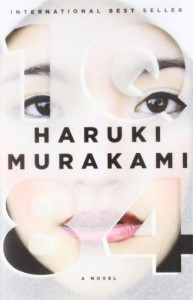13
Followers
35
Following
Stephanie Spines
I like dem pages. Find me youtubin' http://www.youtube.com/user/stephandtimread
1Q84: 3 Volume Boxed Set
 Preface: This is probably an incredibly disorganized review.Okay, Murakami. You got me with this one. You really, really did.My mind is reeling after finishing the beast of a book. It took me over a month to read this. But this book is so packed full of surrealism and magical realism and leaves the reader with SO MANY QUESTIONS and so many threads to ponder.I was hooked from the beginning. The premise of the story is just so interesting, slow parts notwithstanding (what do you expect from a book that is over 1000 pages?). I enjoyed the Orwellian overarching themes of totalitarianism and state/religion control, but this is really the only major parallel I can draw between the two stories. The plot and narratives are so intricately woven over the course of the story. I'm a sucker for stories where we get to see our characters being drawn closer and closer together. I also really appreciate the way Murakami keeps the reader engaged by using this narrative technique and also by raising questions and revealing secrets - some of which are clear cut and some of which are not. I guess overall this was a story about duality, good and evil and parallelism. There are so many connections that Murakami makes that make the reader wonder. For example the connection between Aomame and Fuka-Eri. I was wondering all throughout the story if somehow there was a maza/dohta connection? Also the connection between Ayumi and Tengo's mother, both of whom died the same way and shared some similarities. I also wondered if Tengo was somehow the son of Leader? I remember at some point in the story that his father says that he was "conceived in a vaccuum", or something of the sort, just like Fuka-Eri was. Also the fact that it seems that there is a permeable spacetime barrier that people can pass through (the creepiness of Tengo's comatosed father as the disturbing NHK Collector) I thought the imagery of the two moons was also quite amazing.The characters were all great. I wasn't sure about the addition of Ushikawa's narrative in the third book. It was sudden but I see why he was included. I would definitely problematize the way Murakami writes women, in general, but particularly in 1q84. Thinking back though, I think I always love Murakami's characters. I found it really interesting that Ushikawa was perhaps the most 'human' of all the characters. Tengo, Fuka-Eri and Aomame all had some otherworldliness about them, something alien. The Little People were very odd and their choice of passageways between realities was disturbing. Ho, ho!So now I have all of these questions and very few answers. Thanks, Murakami.
Preface: This is probably an incredibly disorganized review.Okay, Murakami. You got me with this one. You really, really did.My mind is reeling after finishing the beast of a book. It took me over a month to read this. But this book is so packed full of surrealism and magical realism and leaves the reader with SO MANY QUESTIONS and so many threads to ponder.I was hooked from the beginning. The premise of the story is just so interesting, slow parts notwithstanding (what do you expect from a book that is over 1000 pages?). I enjoyed the Orwellian overarching themes of totalitarianism and state/religion control, but this is really the only major parallel I can draw between the two stories. The plot and narratives are so intricately woven over the course of the story. I'm a sucker for stories where we get to see our characters being drawn closer and closer together. I also really appreciate the way Murakami keeps the reader engaged by using this narrative technique and also by raising questions and revealing secrets - some of which are clear cut and some of which are not. I guess overall this was a story about duality, good and evil and parallelism. There are so many connections that Murakami makes that make the reader wonder. For example the connection between Aomame and Fuka-Eri. I was wondering all throughout the story if somehow there was a maza/dohta connection? Also the connection between Ayumi and Tengo's mother, both of whom died the same way and shared some similarities. I also wondered if Tengo was somehow the son of Leader? I remember at some point in the story that his father says that he was "conceived in a vaccuum", or something of the sort, just like Fuka-Eri was. Also the fact that it seems that there is a permeable spacetime barrier that people can pass through (the creepiness of Tengo's comatosed father as the disturbing NHK Collector) I thought the imagery of the two moons was also quite amazing.The characters were all great. I wasn't sure about the addition of Ushikawa's narrative in the third book. It was sudden but I see why he was included. I would definitely problematize the way Murakami writes women, in general, but particularly in 1q84. Thinking back though, I think I always love Murakami's characters. I found it really interesting that Ushikawa was perhaps the most 'human' of all the characters. Tengo, Fuka-Eri and Aomame all had some otherworldliness about them, something alien. The Little People were very odd and their choice of passageways between realities was disturbing. Ho, ho!So now I have all of these questions and very few answers. Thanks, Murakami.


